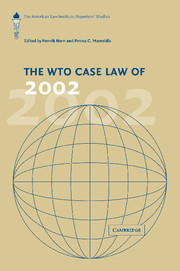Book contents
- Frontmatter
- Contents
- Foreword
- A note on the American Law Institute
- List of reporters
- 1 Introduction
- 2 United States – Section 129(c)(1) of the Uruguay Round Agreements Act (WTO Doc. WT/DS22/R of 15 July 2002): Beating Around (The) Bush
- 3 United States – Tax Treatment for “Foreign Sales Corporations” Recourse to Arbitration by the United States Under Article 22.6 of the DSU and Article 4.11 of the SCM Agreement (WT/DS106/ARB): A Comment
- 4 United States – Countervailing Duties on Certain Corrosion-Resistant Carbon Steel Flat Products from Germany (WTO Doc. WT/DS213/AB/R): The Sounds of Silence
- 5 United States – Countervailing Measures Concerning Certain Products from the European Communities (WTO Doc. WT/DS212/AB/R): Recurring Misunderstanding of Non-Recurring Subsidies
- 6 Canada – Export Credits and Loan Guarantees for Regional Aircraft (WT/DS222/R): A Comment
- 7 United States – Definitive Safeguard Measures on Imports of Circular Welded Carbon Quality Line Pipe From Korea
- 8 Chile – Price Band System and Safeguard Measures Relating to Certain Agricultural Products
- 9 India – Measures Affecting the Automotive Sector
- 10 United States – Section 211 Omnibus Appropriations Act of 1998 (WT/DS176/AB/R): A Comment
- 11 United States – Preliminary Determination with Respect to Certain Softwood Lumber from Canada: What is a Subsidy?
- 12 European Communities – Trade Description of Sardines: Textualism and its Discontent
- Index
- References
10 - United States – Section 211 Omnibus Appropriations Act of 1998 (WT/DS176/AB/R): A Comment
Published online by Cambridge University Press: 06 July 2010
- Frontmatter
- Contents
- Foreword
- A note on the American Law Institute
- List of reporters
- 1 Introduction
- 2 United States – Section 129(c)(1) of the Uruguay Round Agreements Act (WTO Doc. WT/DS22/R of 15 July 2002): Beating Around (The) Bush
- 3 United States – Tax Treatment for “Foreign Sales Corporations” Recourse to Arbitration by the United States Under Article 22.6 of the DSU and Article 4.11 of the SCM Agreement (WT/DS106/ARB): A Comment
- 4 United States – Countervailing Duties on Certain Corrosion-Resistant Carbon Steel Flat Products from Germany (WTO Doc. WT/DS213/AB/R): The Sounds of Silence
- 5 United States – Countervailing Measures Concerning Certain Products from the European Communities (WTO Doc. WT/DS212/AB/R): Recurring Misunderstanding of Non-Recurring Subsidies
- 6 Canada – Export Credits and Loan Guarantees for Regional Aircraft (WT/DS222/R): A Comment
- 7 United States – Definitive Safeguard Measures on Imports of Circular Welded Carbon Quality Line Pipe From Korea
- 8 Chile – Price Band System and Safeguard Measures Relating to Certain Agricultural Products
- 9 India – Measures Affecting the Automotive Sector
- 10 United States – Section 211 Omnibus Appropriations Act of 1998 (WT/DS176/AB/R): A Comment
- 11 United States – Preliminary Determination with Respect to Certain Softwood Lumber from Canada: What is a Subsidy?
- 12 European Communities – Trade Description of Sardines: Textualism and its Discontent
- Index
- References
Summary
As usual the authors have divided their labor, based on expertise. In particular, the economic analysis in section 4 was the responsibility of Damien Neven; Robert Howse's own understanding of the costs and benefits of international trade law rules with respect to intellectual property protection in general depends on a rather different framework for analysing the problem. However, in so far as the legal and economic analysis of the Havana Club case itself is concerned, which deals only with trademarks as a form of IP protection, the authors are in agreement.
Introduction
The first part of the chapter (section 2) summarizes the facts of the case and the decision taken by the Appellate Body (AB). We emphasize two issues that the AB dealt with, namely the extent to which the TRIPs may contain a substantive obligation to grant protection to a trademark registered in another country and National Treatment. Section 3 discusses the notion of trademarks, the trade-offs involved in protecting trademarks and the extent to which trademark protection should be coordinated across jurisdictions. We observe that there is a strong case in favor of trademark protection in terms of alleviating moral hazard and adverse selection in product choices but we also identify instances where trademark protection can be abused. We also observe that the case for coordination across jurisdictions is less compelling for trademarks than other forms of intellectual property.
- Type
- Chapter
- Information
- The WTO Case Law of 2002The American Law Institute Reporters' Studies, pp. 179 - 219Publisher: Cambridge University PressPrint publication year: 2005



